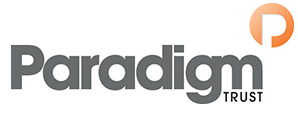Teacher Teaching at Paradigm Trust
With a recruitment crisis in the industry no longer looming but in full blown effect, delivering training that is effective for the trainee and the school is more important than ever.
Recent figures show that the government has been unable to meet its recruitment targets for trainee secondary teachers, only reaching 59% of the target for trainees recruited for Initial Teacher Training (ITT) in the year 2022/23, down from 79% in 2021/22. For primaries the target is predicted to be missed by over 20% this year, so it is essential the training for the people who do sign up for the course is effective.
To deliver high quality teacher training Paradigm has formed strong partnerships with several ITT providers. And as the national ITT framework is closely aligned with the Paradigm framework, it allows trainees to fit in with the Trust’s approach to education and have a good grasp of the pedagogy from the start.
I have been with the Trust for 16 years now, and I have been able to develop myself from a class teacher to principal.
Tahreena Ward, Culloden Primary Academy
Paradigm strongly believes in giving trainees a wide range of experience as they learn. Ben Rogers, Director of Curriculum and Pedagogy at Paradigm Trust says: “During training, Paradigm ensures each trainee spends time in classes across the different Key Stages so they get an understanding of teaching at every level. They will also split their time between different schools to gain a greater range of experiences.
At primary level, this is done at Solebay, Culloden and Old Ford in London, and Murrayfield and Piper’s Vale in Ipswich. Students training to be secondary school teachers will start at Ipswich Academy, and then do an exchange with one of the Trust’s partner schools in the town for the second half of the year.
At Woodbridge Road, our special school for young people with communication and interaction difficulties, from September we will be using a mixture of courses depending on the experience of the teachers we are training.”
The training at Paradigm is led by highly experienced members of staff, with subject leads each delivering the portion of the training which relates to their specialism, so trainees are often as well informed as the teachers of any new developments.
Paradigm also provides an alternative pathway for training, suitable for those who have considerable classroom experience, but didn’t qualify with QTS. After five years they are eligible for an Assessment Only route, which means they can qualify much more quickly than taking the traditional path.
This approach to quality training and career progression is embedded at all levels across the Trust, starting with a thorough programme that is continually reviewed for its effectiveness. New teachers are made to feel part of the Trust on day one, and will gradually be encouraged to take part in network groups formed of staff at different stages of their careers, up to and including members of the SLT. Not only does this familiarise new teachers with other members of staff from across the school, it helps them gain a deep understanding of how the Trust works.
After their first year, teachers can look to move into a subject lead position at Paradigm. This builds experience and confidence as a middle leader. They get the benefit of working with more experienced colleagues and as a team across the wider Trust. It improves their understanding of the curriculum, of how the Trust works as an organisation and how to develop teacher resources, all with peer support from across the Trust.
I started as a cover supervisor after university to gain some experience, and then did teacher training in Geography. The school was extremely supportive, helping me do my Subject Knowledge Enhancement, allowing me to become the geography teacher I am today, career progression here is really good, anyone you talk to is very supportive.
Nicole Tricker, Ipswich Academy
As teachers progress further in their careers at the Trust, they can take advantage of training opportunities funded and delivered by Paradigm programmes for middle, senior and principal level training.
Weekly CPD plays a large part in career development for everyone at Paradigm. This can include a ten-minute observation every fortnight to share teaching practice. This is further supported by feedback and advice. During this process, the experienced teacher may decide to model other approaches and the less experienced member of staff can then try this out in an empty classroom in front of the assessors.
Ben adds “We take professional development very seriously in the Trust. We make effective use of regular coaching, allocating time for instructional coaching and peer coaching. Our peer teaching programme is a continuation of the highly regarded Embedding Formative Assessment programme. Time is given to teachers to observe and coach each other each half term. Our instructional coaching model has been developed to support both new teachers and experienced teachers in a supportive and challenging way. We believe that teachers make the most difference to pupil outcomes and we prioritise teacher development.”
The Trust also coaches leaders for improvement, giving them ownership of their development – as well as accountability.
Through providing the right training and the right support network, Paradigm enables teachers with the right skills and the right attitudes to achieve the level of career progression they aspire to. One of the most notable examples of this is Abbie Thorington. She joined Paradigm Trust in 2014 as an NQT and took advantage of the career development opportunities available, progressing continuously to become principal of Ipswich Academy in 2020.
By ‘growing its own’ the Trust can ensure every teacher is a dedicated and professional individual, who shares its values and matches its ambition to leave a legacy of high achievement and excellence in all it does.
